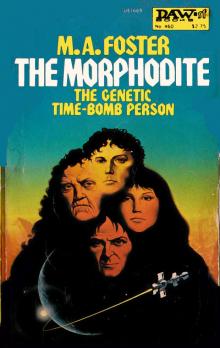- Home
- M. A. Foster
The Transformer Trilogy Page 3
The Transformer Trilogy Read online
Page 3
“Do you intend to pattern another one like this?”
“Decision has not yet been made. We lean toward not doing it again.”
“Understandable. It is a fearsome creature, so the manual alleges.”
“Rightly so. This is not something one would do casually... we can use the facilities for other purposes, and your people will of course be rewarded for this difficult service—just what they deserve.”
“Ah, now, Director, that’s fine to hear that. You know, some of the lads have chafed a bit at the secrecy and the isolation. Not the usual sort of duty.”
“You still have security over your force?”
“Exactly. Positive control, all the way. No leaks. I know that.”
“Good. We’re depending on you. I’ll call down later.”
“We’ll be here.”
Pternam replaced the receiver in its receptacle and turned away with no particular destination in mind. He stopped and practiced an exercise he had often used, that of Confronting the Hidden Antagonist: he understood thereby that his anxiety was commonplace and related solely to waiting for his visitors. Would Avaria find them? Would they come with him? More importantly, would they accept what was being offered here, something of high order indeed? Yes. That was the real issue, the one that would be resolved only as things developed out of the flux.
The doorward, a lobo especially trained for the post, by name Tryono Ektal now, padded softly up the stairs from the lower level, taking, to a person with normal reactions, an excessively long time to assure himself that Pternam was in the room. Finally he said, in a measured, carefully paced monotone, “Ser Pternam, the respectable Avaria approaches through the outer barrier in company with three persons whose aspect is not known to me.”
Pternam said, equally carefully, “All are expected. You may return to your cells and sleep. Your duty has been done this day. Go in peace.”
Ektal nodded solemnly and turned and left. As he left the dim room, a rustle at the lower doorway indicated the approach of Avaria and three others. That would be them, doubtless. He faced away from the landing.
When he turned about again, there they were. Elegro, of course. And with him ... Pternam knew the descriptions well enough. It was the three he wanted.
Avaria said, to the three, “We are secure here, throughout the Residence. You may speak as you will.” As an afterthought he added, “Absolutely. We would not have anyone hear what we ourselves might say here.”
One said, in a low, growling mutter, “Absolute control over a space? Unheard-of, it is. What would Monclova say? Or Femisticleo Chugun, our well-loved Synodic of Law and Order? This makes for islands of individuality, as they say.”
Pternam recognized the speaker as Merigo Lozny: low of brow, head densely furred with bristly, unruly hair the color of cast iron. The nose and chin, however, were sharp, and the eyes glittered and flashed like cursed jewels. The torso was barrel-like, and the legs short and bowed. He looked grotesque, and stupid as well, but Pternam knew very well that Lozny was exceptionally smart, and could be extremely difficult, even among his fellows.
There was a tall, rather athletic man with them. That would be Pericleo Yadom, the ostensible public figure, the front man, the one who spoke for those who manipulated the strings offstage. Were it not for the intense strain lines on his face, he could have been called handsome, and certainly once was. The other, an older man would be Porfirio Charodei; if Lozny was the executive officer of the Underground, and Yadom the front man, then Charodei would fill the position of ideologue. That one had somewhat of the air and manner of a professor, off on an excursion outside his own proper field. But here, Pternam was not fooled, either: he knew from many reports that of all of them, Charodei was by far the most alert and the most dangerous. Yadom would be easy. Lozny would be won over by a logical argument that moved a little too fast for him. But Charodei would be the key to it. Pternam expected the real objection to come from that way.
Avaria said, conversationally, “We are late. Our contact point was to be a Dragon-Field, and of course, we had to mix it up a little.”
Pternam said, “I am surprised no one accosted you. These visitors are not without enemies.”
Yadom said, “It was arranged. Most of those present were our people, mixed with a few genuines.”
Pternam thought, to himself, So they used a Dragon-Field as cover, did they? That damned anarchic game. That would be another hiding place they’d shut off for good after they’d flushed all the insects out.
They did not make polite introductions, for they were known to each other. But Lozny said, “You know what we are. My question is, ‘What are you, that we should come here?’ ”
Pternam answered, as if feeling his way along the lines of an ancient ritual, “I am the alchemist who found the perfect solvent, and now lacks the proper container for this ferocious substance which attacks everything. I have brought the Angel of Death to Paradise Unending.”
Lozny said, “It may be contained by Will and Idea. We have those.”
Charodei added, “This thing we have heard distant rumors of: may it be seen?”
Pternam said, “There is no reason to wait. Come with me.” And without looking to see if they were following, he turned and set off through the halls and corridors of the Residence, eventually leading them downwards, via stair-wells of narrow aspect and precipitous turns, to a much lower level.
Yadom remarked, “You bury it deep; tell me, why would your organization offer the gift of a perfect assassin to those whom you know will use it without restraint?”
Pternam, leading the way, said back over his shoulder, “Avaria and I have seen what must be, for the greatest good of the greatest numbers. Of the world—this world. We have lived in a dream far too long.”
“But you would not use it yourself... ?”
“By giving it to you, I do use it. I place it where it will do the most good. So that you know it. But you will see; there is much we have to say here which will clarify things.”
Pternam had conducted them deep under the Residence, and now they were at one of the lowest levels, in a dim landing. Before them was the confinement facility, a house within a house, so to speak. It was not crude, or hastily constructed. Here, everything was made and finished as well as the rest of the Residence. After they had all collected, he led them into a small antechamber, facing a large window of one-way glass. The view inside was of a large room, furnished for many activities—work, rest, relaxation. It was a cage, but it did not look like one. And inside the room, they could see a man, or what appeared to be a man, seemingly working at a desk, as if performing some study, occasionally writing short notes, or formulas in a commonplace notebook. This was the Morphodite.
Pternam stood back from the window and let them look, but he really didn’t know what they had expected to see. Perhaps some scowling and grimacing savage, more brutish than the wildest Makhak? Or, a golden god-man, wearing a cape and striding back and forth like some frenzied orator? The Morphodite was certainly none of these; as a fact, he seemed to be so ordinary that the sight was disappointing. What they did see through the window appeared to be a mature man, no longer young, slightly worn around the edges, but above average height and with a slim frame that argued agility and self-discipline. His face was so ordinary it was difficult to remember it. He had lank dark hair, loose skin of a sallow-olive color. Except for the interest he showed in his work, he could easily have been one of the lobotomized trusties one often observed in the simple menial positions which were too easy for the labor pool.
After a moment, Lozny asked, “Can it hear us?”
Pternam answered, “No. Nor can he see who is here. But I may add that we have trained him to be extremely sensitive, and sometimes he is aware of observation... As in many cases of this sort, where one reaches into the unknown with both hands, the subject seems to be a bit more than planned.” As if to underline Pternam’s comments, the figure at the desk gave a quick, flickeri
ng glance at the window, almost too fast to be seen, a mere motion of the eyes, and then returned to his studies, turning slightly more away from the window, as if desirous of a deeper concentration. The three visitors glanced uneasily at one another: the glance had held an instant of direst malevolence, of a glittering regard which reduced them all to something considerably less than human.
Lozny asked, “What is he doing in there now?”
Avaria volunteered, “Continuing to refine his main discipline, adding depth to the field we set him upon to study.”
Lozny continued, “Which is? We have little enough time for dilettante intellectuals, as you may well know.”
Pternam explained, not apologetically, but slightly sternly, “This is no idler, but an artisan, a craftsman, of a most subtle art. Here I must make my first exposition; you may have heard something of this, but only a little, for we could not let much of it out.”
Charodei said, “Continue.”
“Very well: throughout human history, or as much of it as we can reach here through the archives, the view has always been that key individuals are the shapers of history, that they hold a society together, make the special decisions that shape the pattern of events. Naturally, it has always been assumed that those key people are the leaders, and therefore the assassin’s trade—that by removing the key leader, they could change the flow, divert the stream. But despite this belief, and the efforts of assassins, somehow things rarely changed according to those acts ... in fact, a sober examination will reveal that assassins rarely have a better rate of success than ordinary murderers in changing societies—ordinary crime. This suggests an error in the view, and so we studied it, and arrived at this startling idea: that there are key people, but that they never show on the surface, that they are almost never the obvious leaders. Unseen, unknown men and women, who unknowingly acted out the ritual mythos of an era.”
Lozny had been growing restive, and now he blurted out, “Nonsense! The masses make history! Currents move in the people, and those currents shape the destiny of the leaders, who are called into being by these currents—and dismissed by them as well.”
“No. The absolute key parts, the balance-points, are hidden within the organism, within the machinery. There has been no way to get to them, or even find them. It is as if the social organism, the machine, is deliberately designed to avoid tampering. But. Ah, yes, but. This individual has been shaped, inculcated, indoctrinated to this new theory. He has followed the initial idea out, and found the ways to make it work: you may view this as a precision tool to determine the identity of the key figures, and how to remove them, using the method calculated to be of maximum effectiveness. I will not enumerate all the forms of training he has had. I will say that he had to take what was a wild idea and carry it far beyond the bounds of what we thought we knew, what we suspected. This was self-training. He works at it yet. He is so far beyond us in this area that I find his explanations totally incomprehensible. So do the rest of us, who have been involved with training him. But hear me: we know for an undeniable fact that whatever he does, it works with a precision beyond our wildest dreams, and he does as he says he will do. He is absolutely dependable.”
Charodei said, “You have tested him?”
“You may recall an incident a while back ... in Vredam. There was a spectacular murder, I believe, which caused the surfacing and dissolution of a peculiar organization known as the Acmeists ... That is a sample.”
Yadom whispered, “The Acmeists were not of us, but they were valuable allies. That event evoked much distress.”
Pternam stood his ground. Now was no time for apologies. “We could not risk using the weapon untested. And most certainly we would not have offered it to you.”
Lozny snorted, “Hmf. Clispic scumbags, one and all. We are better purged of such trash. Pternam here, did us a favor. We would have made their eyes water ourselves, after we’d got the mileage out of them.”
Charodei thought for a moment, and said, “I agree in part with Merigo, although I would not say it so definitively.” And to Pternam he said, “How did you know to limit the test... or keep the results confined?”
“Those were the instructions we gave to the weapon.”
Yadom said, “All right. So much is true. Still, it was a dangerous game that was played there. Pternam, if he’s that good, why wouldn’t you just use him yourself... you could even turn him loose on us!” Yadom already knew that Pternam wouldn’t, because he hadn’t. But the question was to uncover why.
Pternam answered, “True. We could do just that. But some of us wish change, too, and if we turned him loose on you, then there would be no opposition at all worthy of the name. No. But more importantly, I have no vision of the world I would build, and I am not experienced in guiding others in such tasks. Tear down? Yes, we would help there, but no one has much of an idea for rebuilding. You have this, and have for a long time. There: I speak directly.”
Lozny said, quietly, “So you offer him to us, because you know we’ll use him. And we would, if he’s half what you say he is. I understand. You came late to the truth. And you must know that there will be little use for an organization such as this, afterwards ...”
Yadom said, “You must have used him to foresee things we cannot. If you are as high in the counsels of the State as we think you are, then you must know our fortunes have been poor the last few years, great and small.”
Pternam said, “It is because of some of his insights that we conceived the idea to present him to you in the first place.”
Charodei said, “In other words, you foresee through his program that whatever our present fortunes are, we have something like time on our side, and you want to make sure you are supporting the winning side.”
“Not entirely. There is an element of chance here, and of choice.”
Charodei was not satisfied, but he continued: “The words were whispered in the night, and the winds carried it. Night-things spoke of it, and in the darkness we also heard. And so also we heard rumors—that societies are founded on hidden, secret balance-points: unknown people, the crucial hinges. Pull them out and the structure falls.”
Pternam corrected him, “Pull them out and the structure adjusts to a new pattern of stresses.”
Charodei persisted, “Very well, Consider the theory as if it were true. Why not give us the theory, and let us use it—train our own people? Why do we need this dire creature of the night? Just give us the concept, and we’ll take it from there; we have the material to do it with.”
Pternam said, “It is not something I can give anyone, because I have not been able to comprehend it. It is alien to our most basic thought-patterns. I have tried, and failed. None of the other workers associated with this has been able to make any more of it. No: we told him, ‘Here it is—develop it.’ And he’s done it, but he can’t tell us how. He’s so far into it that he would have to train us over from scratch so that we could understand it. This came early, and so we then trained him to the rest, so someone could implement it ... all the arts of violence, mayhem, pain, death and disfigurement. And the best of all, that he can totally change his identity with the proper stimulus, and thus vanish after the deed.”
Lozny said, “We heard somewhat of this. How so? Change? In what way—disguises are susceptible to penetration, as we have found out.”
“Not disguise, but change. It came out of our studies of the hormone system. We have known for some time that certain aspects of exterior forms of the body are controlled by hormone secretions—the shape of certain muscle groups, certain fatty areas, the distribution of patterns of facial and body hair. But there is more—the whole body is under these controls. It’s just a matter of finding the key to the system. It’s a little disturbing to understand it, but as real as you seem to yourself, you are not a fixed reality, but a wave in Time; every two thousand days, the cells in your body have changed, and so you are different. We found a way to uncouple this process from the memory and the cont
rols built in, and reset the master control, as it were. You change, constantly, held in precarious balance... we found a way to speed the process up, to what you might call catastrophic change.”
Charodei asked, “What kinds of time are we talking about?”
“Most can’t do it, so we have to screen for those who can, and then train them to the degree of concentration required. At the extremes we have the subject attain, I have to refer to the state of consciousness as an intense trance state, something on the order of self-hypnosis, or yogic concentration... The process won’t work at all if the time involved in the change is more than three or four days, and the release of metabolic by-products which poison the organism limits its shorter end to about a day—this is for the ones who can live through it. At the end of it, even the genetic code is changed, and the sex of the subject changes as a by-product, and the age as well, or rather the appearance of age. In fact, we have succeeded with only one. This one is the only one, and he’s only gone through one change.”
Yadom exclaimed, “Sex?”
“Everything.” Pternam gestured at the Morphodite. “That was originally a woman, an old derelict we selected out of the sloggers of the Labor Pool last-leggers. She was far gone, but somehow she responded.”
Charodei breathed, “Woman! And now it’s a man?”
Pternam said, “That was Jedily Tulilly, who is officially listed as being deceased. That is now an unregistered adult male whom we call Tiresio Rael.”
Charodei said, “Tiresio! You dared name him that, or did you know?”
Pternam said, “The name was picked, so far as I know, at random.”
Charodei explained, “In Hellas, on Earth, there was an oracle who was called Tiresias, who was said to have been both man and woman. And this Tiresio ... Ah, I see, a most perilous weapon, I think I see. But go on. We are your guests.”

 The Book of the Ler
The Book of the Ler Marriage, Mayhem & Happily Ever After
Marriage, Mayhem & Happily Ever After Cougar
Cougar Jaybird
Jaybird Mackenzie (Heritage Bay Series Book 2)
Mackenzie (Heritage Bay Series Book 2) Baller (Heritage Bay Series Book 5)
Baller (Heritage Bay Series Book 5) The Morphodite
The Morphodite